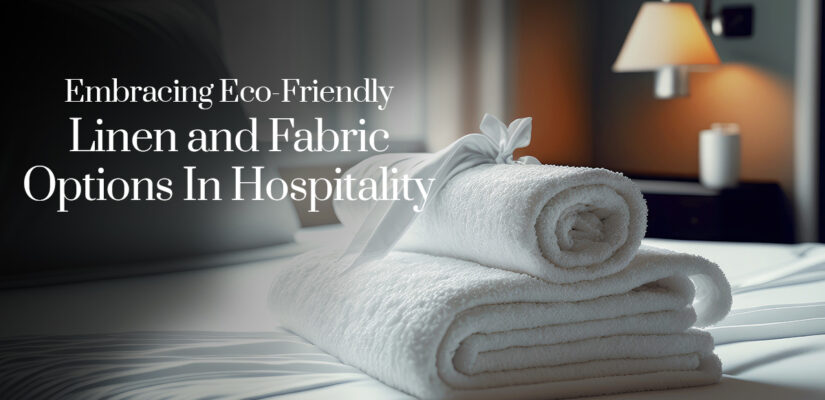
Embracing Eco-Friendly Linen and Fabric Options In Hospitality
In the realm of hospitality, the pursuit of sustainability has become more than just a trend—it’s a necessity. With the increasing awareness among people of environmental issues and a growing desire among consumers for eco-conscious options, hotels are under pressure to adopt more sustainable practices throughout their operations. One area where hotels can make a significant impact is in their choice of linen and fabric options. By opting for eco-friendly materials, hotels can reduce their environmental footprint while also appealing to environmentally conscious guests. In this blog by Hitech Vision, The best hotel linen suppliers in Chennai we’ll explore some of the eco-friendly linen and fabric options available to hotels and the benefits they offer.
The Importance of Sustainable Linen and Fabric Choices
Before diving into specific options, let’s first understand why sustainable linen and fabric choices matter in the hospitality industry. Traditional textiles, such as cotton and polyester, often come with a hefty environmental cost. The production of conventional cotton, for example, requires vast amounts of water, pesticides, and energy, contributing to water scarcity, pollution, and greenhouse gas emissions. Similarly, polyester, derived from fossil fuels, is non-biodegradable and contributes to plastic pollution.
By contrast, eco-friendly fabrics are produced using sustainable practices and materials that minimize harm to the environment. These materials are typically organic, renewable, biodegradable, or recycled, offering a more sustainable alternative to conventional options. By incorporating these fabrics into their operations, hotels can reduce their impact and contribute to a more sustainable future.
Eco-Friendly Fabric Options for Hotels
1. Organic Cotton:
Organic cotton is cultivated without synthetic pesticides or fertilizers, reducing water consumption and minimizing environmental pollution. Additionally, organic cotton farming promotes soil health and biodiversity. Hotels can use organic cotton for bed linens, towels, bathrobes, and other textile products, offering guests a luxurious and sustainable experience.
2. Bamboo:
Bamboo is a resource that requires minimal water and no pesticides to grow. It also has natural antibacterial properties, making it an excellent choice for linens and towels in hotel bathrooms. Bamboo fabrics are soft, breathable, and biodegradable, providing guests with both comfort and peace of mind. Hotel linen supplier make sure that the customers are satisfied with the products they choose.
3. Hemp:
Hemp is one of the most sustainable fabrics available, requiring little water, pesticides, or fertilizers to grow. It is also durable and naturally resistant to mold, making it perfect for use in hotel linens, upholstery, and curtains. Hemp fabrics have a unique texture and appearance, adding a touch of rustic elegance to hotel interiors.
4. Recycled Polyester:
While conventional polyester poses environmental challenges, recycled polyester offers a more sustainable alternative. Made from recycled plastic and other consumer waste, recycled polyester helps divert materials from landfills and reduces the need for virgin resources. Hotels can use recycled polyester for curtains, upholstery, and decorative pillows, giving new life to old materials.
5. Tencel (Lyocell):
Tencel, also known as Lyocell, is a sustainable fabric made from wood pulp from responsibly managed forests. The production process is energy-efficient and involves a closed-loop system that recycles water and solvents. Tencel fabrics are soft, breathable, and biodegradable, making them suitable for a wide range of hotel textiles, including bedding, curtains, and upholstery.
Benefits of Eco-Friendly Linen and Fabric Choices
1. Environmental Impact:
By choosing eco-friendly materials, hotels can reduce their carbon footprint, conserve water, and minimize pollution. Sustainable fabrics require fewer resources to produce and often have lower emissions throughout their lifecycle, contributing to a healthier planet.
2. Guest Satisfaction:
Increasingly, travelers are seeking out eco-friendly accommodations that align with their values. By offering sustainable linens and fabrics, hotels can attract environmentally conscious guests and improve their overall experience. Guests appreciate knowing that their stay is contributing to positive environmental outcomes.
3. Brand Reputation:
Adopting sustainable practices can enhance a hotel’s reputation and set it apart from competitors. Guests are likely to select hotels that choose sustainability, leading to increased loyalty and positive recommendations.
4. Long-Term Cost Savings:
While eco-friendly fabrics may have a higher upfront cost, they often offer long-term savings through reduced resource consumption and durability. High-quality sustainable textiles are less prone to wear and tear, resulting in lower replacement and maintenance costs over time.
Conclusion
Incorporating eco-friendly linen and fabric options into hotel operations is not only a responsible choice but also a smart business decision. By prioritizing sustainability, hotels can reduce their environmental footprint, enhance guest satisfaction, and build a positive brand reputation. From organic cotton to recycled plastic, there are numerous eco-friendly fabrics available to meet the needs of hotels of all sizes and styles. By embracing sustainable textiles, hotel linen manufacturers in India play an important role in shaping a more sustainable future for the hospitality industry and beyond.